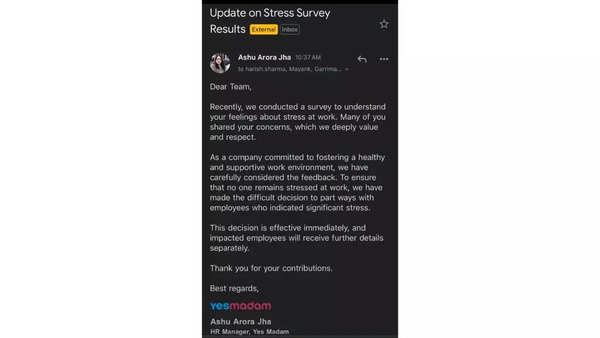
YesMadam, a salon home service startup, has sparked controversy after a supposed HR email went viral. The email claimed the company had surveyed its employees about workplace stress—and then fired those who admitted they were stressed. The irony hasn’t been lost on the internet.

An email from YesMadam’s HR team reportedly said the company asked employees about their stress levels at work. However, those who said they felt “significant stress” were fired. While the goal might have been to improve the work environment, the decision caused confusion and many people found it odd. While YesMadam is yet to comment on the situation, the move has drawn sharp criticism and sparked memes across social media.
The email said “Dear Team,
Recently, we conducted a survey to understand your feelings about stress at work. Many of you shared your concerns, which we deeply value and respect.
As a company committed to fostering a healthy and supportive work environment, we have carefully considered the feedback. To ensure that no one remains stressed at work, we have made the difficult decision to part ways with employees who indicated significant stress.

Was this an attempt to relieve stress or just a strange way of firing employees? Social media had a lot to say, with reactions ranging from disbelief to memes making fun of how this could be a “stress-free” way to run an office. The truth behind the email is still unclear, but it has definitely started a conversation about how companies deal with stress at work.

Image credits: LinkedIn
So, is this a genuine HR blunder, a misinterpreted action, or simply a prank gone viral? For now, it’s got everyone talking—and perhaps rethinking their answers to workplace surveys!
Workplace Anxiety Linked to Rising Health Issues Among Employees

